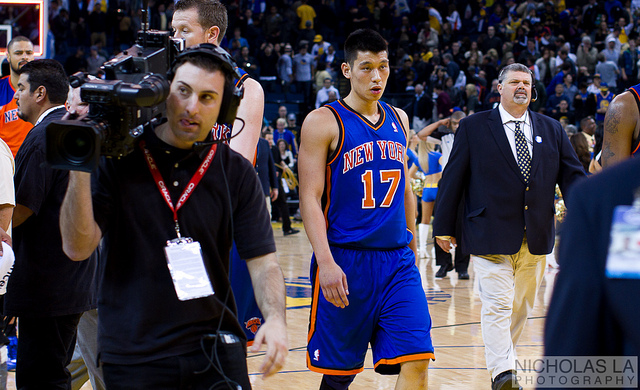Football Freakonomics: What Can Linsanity Teach Us About the Upcoming NFL Draft?
The following is a cross-post from our Football Freakonomics project at NFL.com. Check out the interactive graphic and, at the end of this post, the video.
In his first six NBA starts, Jeremy Lin averaged 24.3 points and 9.5 assists while leading the Knicks to six straight wins.
If those numbers were attached to someone like Kobe Bryant or LeBron James, you wouldn’t bat an eye. But until a couple weeks ago, Lin was little more than roster fodder, an undrafted player already cut by two teams and about to be cut by his third. That’s when a desperate coach who had run out of able-bodied point guards threw him into the fire. The rest – for the moment, at least – is history.
Let’s be honest: the reason we’re hearing so much about Lin is because he was overlooked. This might lead you to think he’s a true anomaly, a great game-time athlete who somehow slipped through a pro sports league’s finely-tuned talent-scouting machine.
But if you look closely at the NFL, you’ll find Jeremy Lins all over the place. And with the NFL Draft coming up in April, you have to wonder just how scientific the science of drafting football players really is. Is Andrew Luck really the golden goose that Indianapolis is banking on, or might he turn out to be yet another top-tier bust?
Our latest Football Freakonomics episode — the last one this season — argues that the draft is much more of a crapshoot than most of its practitioners would have us think. The evidence is everywhere. Consider the research of Cade Massey and Richard Thaler, who find top draft picks to be seriously overvalued. Consider the data presented in the interactive graphic here, which reveals the average draft position for the top five players this season in key categories. For instance:
2011 Passing Yards (Avg. Draft Position for Top 5 Performers = 51.4)
|
|
Player |
|
|
||
|
|
Drew Brees |
32 |
|
||
|
|
Tom Brady |
199 |
|
||
|
|
Matthew Stafford |
1 |
|
||
|
|
Eli Manning |
1 |
|
||
|
|
Aaron Rodgers |
24 |
2011 Rushing Yards (Avg. Draft Position for Top 5 Performers = 115.8)
|
|
Player |
|
|
||
|
|
Maurice Jones Drew |
60 |
|
||
|
|
Ray Rice* |
55 |
|
||
|
|
Michael Turner |
154 |
|
||
|
|
LeSean McCoy |
53 |
|
||
|
|
Arian Foster** |
Undrafted (257) |
* Rice was the MVB (Most Valuable Bargain) in our inaugural Dough Bowl.
** We generously counted each undrafted player as if he was the first player chosen after “Mr. Irrelevant,” the last player chosen in that year’s draft. In Foster’s case, that would make him pick No. 257.
2011 Tackles (Avg. Draft Position for Top 5 Performers = 78.6)
|
|
Player |
|
|
||
|
|
London Fletcher |
Undrafted (242) |
|
||
|
|
D’Qwell Jackson |
34 |
|
||
|
|
Chad Greenway |
17 |
|
||
|
|
Pat Angerer |
63 |
|
||
|
|
Curtis Lofton |
37 |
2011 Receiving Yards Leaders (Avg. Draft Position for Top 5 Performers = 118.2)
|
|
Player |
|
|
||
|
|
Calvin Johnson |
2 |
|
||
|
|
Wes Welker |
Undrafted (256) |
|
||
|
|
Victor Cruz |
Undrafted (256) |
|
||
|
|
Larry Fitzgerald |
3 |
|
||
|
|
Steve Smith (CAR) |
74 |
This year’s sack leaders represented the highest average overall draft position:
2011 Sacks (Avg. Draft Position for Top 5 Performers = 32.7)
|
|
Player |
|
|
||
|
|
Jared Allen |
126 |
|
||
|
|
DeMarcus Ware |
11 |
|
||
|
|
Jason Babin |
27 |
|
||
|
|
Jason Pierre-Paul |
15 |
|
||
|
|
(T5) Aldon Smith |
7 |
|||
|
|
(T5) Terrell Suggs |
10 |
Keep in mind that an average draft position of 100 is eq
uivalent to a top pick in the fourth round. What’s most interesting is that in several major categories, the top five performers included at least one undrafted free agent. Or, put another way: One of the top five performers in these categories includes a player who wasn’t even thought to be among the top 250 players of his rookie class!
Granted, these numbers aren’t exactly encyclopedic. But they do a good job of showing just how much luck is involved in the draft — to say nothing of how much Luck — and how hard it is to forecast the future.
That’s why more and more teams, in all sports, are doing a deep statistical dive to try to identify undervalued players before spending too much money on the overvalued ones. So if you’re an NFL team looking to optimize your draft picks this year, maybe you’ll consider hiring a young guy to crunch the numbers for you. Maybe some economics major from Harvard who happens to know his way around the gym? Maybe someone like … Jeremy Lin?


Comments